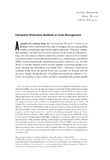| dc.contributor.author | Edstrom, Jerker | |
| dc.contributor.author | Greig, Alan | |
| dc.contributor.author | Skinner, Chloe | |
| dc.date.accessioned | 2023-11-23T14:41:52Z | |
| dc.date.available | 2023-11-23T14:41:52Z | |
| dc.date.issued | 2023-11-20 | |
| dc.identifier.citation | Edström, J., Greig, A. and C. Skinner (2023) ‘Patriarchal (Dis)Orders: Backlash as Crisis Management.’ Signs: Journal of Women in Culture and Society, 49(2):277-309, DOI: 10.1086/726744 | en |
| dc.identifier.uri | https://opendocs.ids.ac.uk/opendocs/handle/20.500.12413/18186 | |
| dc.description.abstract | Amid a rising tide of misogyny and gender violence across the world, terms like “patriarchal backlash” have increased in use to describe similar trends in different settings. Yet, backlash remains contested as a concept, variably perceived as an expression of male resistance, a patriarchal restoration, or a mode through which a broader reactionary politics play out and coalesce. Recognizing that the predominance of recent academic literature on backlash centers on Europe and the Americas, we explore a broader set of debates, questioning how we can better understand backlash in a global context. We argue that backlash can be framed as a form of crisis management, as a confluence of crises—political, economic, climate, and pandemic—that create volatility in hierarchical social relations, threatening the reproduction of elite rule and capitalist growth. “Governments dream of docile, domesticated, and privatized lives,” Françoise Vergès reminds us, and patriarchal backlash serves to reimpose order through a series of spatial fixes in the individual space of the sexed body, the privatized space of the traditional family, and the bordered, ordered space of the ethnically imagined nation. Amid a felt sense of crisis and ensuing ontological insecurity, hierarchies are fixed in place through appeals to a naturalized gender order, itself structured by racialized, neocolonial relations of power operating within and across national borders. As sites of struggle over discursive meaning and material resources, the body, family, and nation are critical spaces in which to counter backlash and its fixing of hierarchies. | en |
| dc.language.iso | en | en |
| dc.publisher | The University of Chicago | en |
| dc.rights.uri | http://creativecommons.org/licenses/by-nc/4.0/ | en |
| dc.subject | Gender | en |
| dc.subject | Sexuality and Development | en |
| dc.title | Patriarchal (Dis)orders: Backlash as Crisis Management | en |
| dc.type | Article | en |
| dc.rights.holder | © 2023 The University of Chicago | en |
| dc.identifier.externaluri | https://www.journals.uchicago.edu/doi/abs/10.1086/726744 | en |
| dc.identifier.team | Power and Popular Politics | en |
| dc.identifier.doi | 10.1086/726744 | |
| rioxxterms.funder | Default funder | en |
| rioxxterms.identifier.project | Countering Backlash | en |
| rioxxterms.version | VoR | en |
| rioxxterms.versionofrecord | 10.1086/726744 | en |
| rioxxterms.funder.project | b885acf3-8075-4f92-9c40-49db2130c75d | en |


